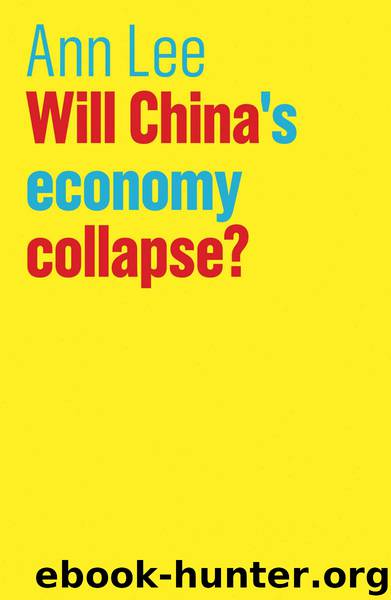Will China's Economy Collapse? by Ann Lee

Author:Ann Lee
Language: eng
Format: epub
ISBN: 9781509520176
Publisher: Wiley
Published: 2017-07-17T00:00:00+00:00
Fiscal Policies
China has fiscal policies that are probably more appropriately called growth policies, because the budgets are often tied to aspirational goals for the country. In the United States, budgets are allocated to different departments regardless of their output. By contrast, China’s fiscal budgets are accompanied by measuring sticks to determine whether the budgeted money achieved the desired outcome, albeit with lots of inefficiencies. Five-year strategic plans figure into budgets, and while China has often been criticized as being a bad allocator of capital because the central government can overshadow the invisible hand of the market, it is hard to sustain such an argument when it has not suffered the extreme boom/bust cycles that have plagued market economies and has developed faster than any other country on record.
China’s fiscal policies thus can help avert domestic economic disaster since they are designed to support strategic growth and modernize the country over all other considerations. Through its fiscal policies, China can still increase infrastructure and social spending to offset anemic exports, for instance. Infrastructure spending could include projects for more subways, railways, environmental cleanup, and alternative energy. Social spending could see an uptick in senior citizen homes, more parks and recreation areas, and more vocational training programs.
The problem in China is that the fiscal system is intertwined with the financial system. Since local governments have created companies to borrow from the banking system to fund infrastructure investments, the government is therefore in more direct competition against the private sector. Serving both public and private interests from the same institutions makes it more difficult to separate which activities are purely for profit and which ones serve a more public service purpose.
To make fiscal policies more effective, then, China has now allowed local governments to issue bonds directly in the capital markets so that the separation of public and private capital can be cleaner. With fiscal budgets that will eventually be more transparent once the bank loans roll off the banks’ balance sheets, the government can more easily track which fiscal policies have had the biggest impact in generating adequate demand to meet China’s already overly productive supply.
China’s fiscal spending can have the most immediate impact by increasing social spending such as welfare payments and other programs that put money directly into the hands of consumers. Compared to Western economies, China’s social spending is about half of that in other middle-income countries and only just a third of that of the rich OECD countries according to the “China 2030” report by the World Bank. Bringing social spending levels higher would instantly increase consumer demand and ratchet GDP up a couple of percentage points. But doing so could run the risk of destroying the strong work ethic that has powered China for the last few decades. Nevertheless, a carefully crafted fiscal program aimed at providing more support for the elderly, better healthcare for the poor, more comprehensive child support for working mothers, and comprehensive support for handicapped people would inject greater consumer demand into the economy without creating perverse incentives to slack and rely on welfare.
Download
This site does not store any files on its server. We only index and link to content provided by other sites. Please contact the content providers to delete copyright contents if any and email us, we'll remove relevant links or contents immediately.
| Anthropology | Archaeology |
| Philosophy | Politics & Government |
| Social Sciences | Sociology |
| Women's Studies |
The Secret History by Donna Tartt(19023)
The Social Justice Warrior Handbook by Lisa De Pasquale(12182)
Thirteen Reasons Why by Jay Asher(8881)
This Is How You Lose Her by Junot Diaz(6869)
Weapons of Math Destruction by Cathy O'Neil(6260)
Zero to One by Peter Thiel(5782)
Beartown by Fredrik Backman(5729)
The Myth of the Strong Leader by Archie Brown(5491)
The Fire Next Time by James Baldwin(5421)
How Democracies Die by Steven Levitsky & Daniel Ziblatt(5209)
Promise Me, Dad by Joe Biden(5139)
Stone's Rules by Roger Stone(5078)
A Higher Loyalty: Truth, Lies, and Leadership by James Comey(4945)
100 Deadly Skills by Clint Emerson(4910)
Rise and Kill First by Ronen Bergman(4772)
Secrecy World by Jake Bernstein(4736)
The David Icke Guide to the Global Conspiracy (and how to end it) by David Icke(4696)
The Farm by Tom Rob Smith(4499)
The Doomsday Machine by Daniel Ellsberg(4480)
